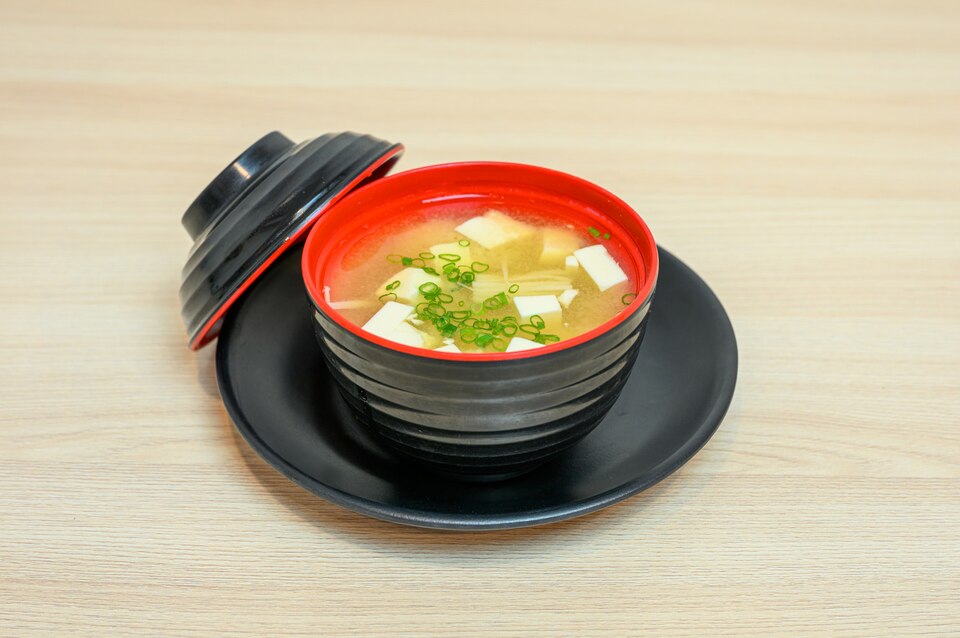When dieting, people frequently turn to unusual friends, like miso soup. Due to its appeal among weight-conscious people, its effectiveness is being investigated. Beyond food, we compare appealing material to ambiguity and burstiness to explain the association between miso soup and weight loss.
What Science Says About Miso Soup And Weight Loss
Scientific research on miso soup and weight reduction is intriguing. Low calories and albumin, a protein, support the soup’s effectiveness. Studies show that adding miso paste to soups may increase satiety and reduce calorie consumption. This dynamic interaction between miso soup’s nutritional and psychological components shows its varied weight control impact. The scientific perspective reveals miso soup’s possible appetite-suppressing properties and how it might be an intelligent weight-reduction supplement.
The Nutritional Powerhouse Of Miso Soup
Miso soup is a nutritional powerhouse with a rich tapestry of ingredients that taste great and are healthy. Miso soup is built from fermented soybeans, which produce red, white, and mixed miso. This fermentation adds spinach, carrots, bok choy, and onions, boosting taste and nutrients.
The B12 complex in miso soup makes it nutritious. This crucial vitamin boosts energy metabolism and may assist you to lose weight by burning more calories. Protective fatty acids from natural fats and oils are in miso soup. The body may produce the most essential fatty acids. However, omega-3 in miso soup helps maintain a healthy weight.
While miso soup’s fermentation process adds taste, it also increases salt. Appreciating the nutritional advantages while considering the negatives is necessary. Miso soup is a nutritional powerhouse due to its low calories and wide range of essential elements, which promote satiety and well-being.
The Role Of Miso Soup In Boosting Metabolism
Miso soup boosts metabolism in addition to its taste. Miso soup contains vitamin B12, which supports metabolism. As an energy catalyst, this vitamin boosts calorie burning. Understanding how miso soup helps control weight depends on the relationship between B12 consumption and metabolic rate.
In addition to B12, miso soup contains healthy fatty acids from natural fats and oils. This combination boosts metabolism and promotes calorie balance. Thus, miso soup’s B12 and fatty acids make it more than a tasty dish—it supports metabolic activities necessary for weight management. Miso soup becomes a gourmet treat and a powerful ally in metabolic well-being as people lose weight.
Why Miso Soup Facilitates Weight Loss
Miso soup helps you lose weight because of its unique composition and ability to address crucial diet issues. Miso soup’s low calories and high protein content make it stand out beyond its simplicity and convenience of preparation. This combo reduces calorie consumption by making you feel full before meals. The key is satisfying without overpowering, which helps limit overeating.
Miso soup reduces weight with 25 calories and 2 grams of protein per bowl. It makes people feel satiated for longer, encouraging them to eat fewer calories at future meals. Beyond weight loss, miso soup improves heart health and general well-being.
Miso soup is adaptable and tasty, making it a simple yet effective weight-reduction tool. Its promise resides in its sustainability and enjoyment as a balanced diet component and instant gratification. Miso soup is a tasty, substantial, and calorie-conscious option for dieters.
Overcoming The Disadvantages Of Miso Soup
Those who want to eat miso soup while being healthy must overcome its drawbacks. Miso soup has many nutritional advantages. However, its fermentation and salt levels have downsides. Here are practical ways to overcome these obstacles:
1. Choose Low-sodium Miso Paste:
Use low-sodium miso paste to make miso soup. This lets you experience miso’s taste and nutrients without salt. Many grocery shops now provide low-sodium choices for health-conscious shoppers.
2. Control Portion Sizes:
Miso soup requires moderation. Portion control lowers salt consumption. Instead of eating a lot at once, try smaller portions throughout the day. This way, you may enjoy the taste without exceeding your salt intake.
3. Balance With Fresh Ingredients:
Add plenty of fresh ingredients to miso soup to reduce its sodium content. Add veggies, greens, and tofu to your soup. The added ingredients boost nutrients and dilute salt, making the meal more balanced and healthy.
4. Homemade Broth With Reduced Sodium:
Prepare miso soup with homemade broth to reduce sodium. This lets you control salt levels for a tasty, healthy meal. Try low-sodium broth recipes or add herbs and spices for taste.
5. Rinse Pickled Ingredients:
Rinse seaweed and pickled veggies before using them in miso soup. This easy technique reduces sodium in the meal while keeping the taste.
6. Diversify Your Miso Choices:
Try red, white, or mixed miso. Each has its own taste and salt content. Diversifying your miso selections might help you manage high salt levels by matching your taste preferences and nutritional objectives.
Practical Tips: Incorporating Miso Soup Into Your Weight Loss Journey
Miso soup is a tasty and healthy weight-loss aid. Try these strategies to optimize miso soup’s advantages and improve your weight reduction journey.
- Add Fruits: Mixing fruits into miso soup boosts its nutrients. Fruits provide vitamins and antioxidants and add taste, whether you like sliced apples or orange segments.
- Protein Boost with Eggs: Protein ingredients like eggs fill miso soup. Eggs soft-boiled or poached in soup are substantial and delicious. Protein keeps you full, helping you lose weight.
- Veggies for Extra Nutrients: Adding a variety of veggies to your miso soup will make it healthier. Dark, leafy greens like spinach, kale, carrots, mushrooms, and bok choy offer color, vitamins, minerals, and fiber to a balanced diet.
- How to Use Legumes for Long-Lasting Energy: To add more nutrition to your miso soup, try adding kidney beans, lentils, black beans, or peanuts. Legumes include protein, fiber, and vitamins to maintain energy and satisfy you.
- Use Probiotics: Fermented miso soup includes probiotics. Add more probiotics to your diet to improve gut health. You eat miso soup with yogurt, kefir, or kimchi for intestinal health.
- Mindful Portion Control: Miso soup is low-calorie, but portion management is essential. Watch your portion quantities to enjoy the soup’s advantages while losing weight.
Conclusion
As a weight-loss tool, miso soup is practical and healthful. Its simplicity and nutritional value make it a balanced diet ally. However, knowing its salt content and its risks emphasizes judicious usage. Miso soup may be a tasty partner for sustained weight control in moderation and mindful integrati










